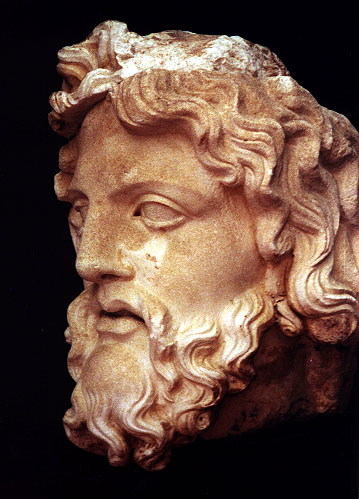 f all Olympian gods, Zeus was considered to be the greatest. He was a son of Cronus (Saturnus) and Rhea, a brother of Poseidon (Neptunus), Hades (Pluto), Hestia (Vesta), Demeter (Ceres) and Hera (Juno). He was leader of the gods and was present at the creation. When the world was made from out of Gaia and Uranus, and set in motion by Cronus, Zeus and his brothers distributed the government of the world among themselves by lot. Poseidon was to have the sea, Hades the lower world and Zeus the heavens and upper world.
f all Olympian gods, Zeus was considered to be the greatest. He was a son of Cronus (Saturnus) and Rhea, a brother of Poseidon (Neptunus), Hades (Pluto), Hestia (Vesta), Demeter (Ceres) and Hera (Juno). He was leader of the gods and was present at the creation. When the world was made from out of Gaia and Uranus, and set in motion by Cronus, Zeus and his brothers distributed the government of the world among themselves by lot. Poseidon was to have the sea, Hades the lower world and Zeus the heavens and upper world.

According to prophecy his father, Cronus, was to be dethroned by one of his children, and usurped of power over the earth. Cronus thus began to devour all his children except for the baby Zeus who was spirited away to a cave on a mountain in Crete to be raised in secret by the goat nymph Amalthea who nursed him with nectar and ambrosia.
Zeus's playmate was his foster brother, the Goat-Pan.
Outside the cave, Gaia (the earth) had set the armed Curetes to clash their swords against their shields so that Cronus would not be able to hear the baby cry. Zeus later expressed his gratitude to Amalthea by placing her in the heavens as the constellation Capricorn.
Zeus attained adulthood quickly and took the Titaness Metis as his first wife. Metis, the personification of prudence and daughter of Tethys and Oceanus, counseled Zeus against trying to usurp his father Cronus on his own. Instead, she and Rhea (daughter of the heavens), whose first five children had been swallowed by Cronus, prepared an emetic which they mixed with Cronus's favorite drink.
When he drank the potion he was forced to expel his consumed offspring, Hestia, Demeter, Hera, Hades, and Poseidon.
With his newly restored brothers and sisters, Zeus now warred on the Titans who were guardians of the world. Their leader was the mighty Atlas. Zeus killed Campe, the jaileress of Tartarus, and set free the Cyclopes and Hecatoncheires. The Cyclops, now enlisted in the war against the Titans, forged a thunderbolt for Zeus, a trident for Poseidon, and a helmet of invisibility for Hades.
The three brothers fought Cronus, who was their father and ruler of the world. Zeus struck him with his thunderbolt. The Hecatoncheires barraged the rest of the Titans with rocks. When a loud cry from the Goat-Pan struck terror into the Titans they fled to Tartarus with the Hundred-Handed Ones as guards. No harm came to the Titanesses because their number included Zeus's mother Rhea and his wife Metis. After Zeus had blasted the monster Typhon with his thunderbolt, he moved the idea of government.
The three sons of Cronus, Zeus, Poseidon and Hades, drew lots for the rulership and governance of the world. Poseidon became the god of the seas, Hades of the dead and the underworld, and Zeus of the heavens. The earth was to be common to all three.
Zeus now settled the gods on Mount Olympus which was so high that its lofty peak penetrated Heaven itself. The King of the newly established Olympian gods turned himself into a serpent and slept with Rhea. He then went on to create the Nine Muses from the Titaness Mnemosyne (memory) and the Seasons and three Fates from Themis, the goddess of justice.
Hermes was his son by Atlas's daughter Maia. Zeus then married Leto who gave birth to Apollo and Artemis. With Hera, his children were Hebe, Ares and Ilythria. Zeus then gave birth to Athena, who had no mother, for she sprang out of his head in full battle armour..
Semele, daughter of King Cadmus of Thebes, was beloved of Zeus, but Hera, his principal wife, who was jealous of her, appeared to her in the form of an aged nurse and induced her to ask Zeus to appear to her in his true splendour and majesty. As no mortal or god may behold Zeus in his true or pure form Semele was tempting fate. Zeus, who had given Semele any wish complied with her foolish request. The mortal woman was burned to a cinder amid thunder and lightning.
Semele's child Dionysus, was saved from the flames by Hermes and eventually became the god of wine, intoxication, and revelry. Thus Dionysus is sometimes associated with Greek tragedy and drama. He is sometimes called digonos or twice born, and is usually depicted as a feminine youth with beard, small horns and vine tendrils. Other liasions of Zeus resulted in the birth of heros such as Perseus, Minos, and Heracles.
